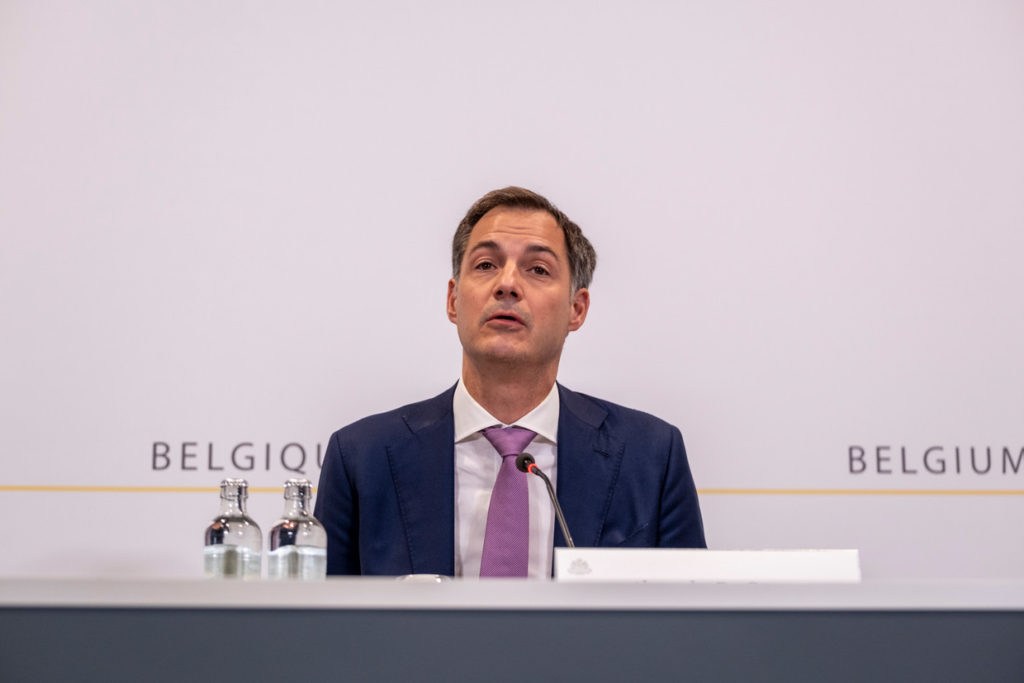For the third time in as many weeks, Belgium is implementing additional restrictions to slow the spread of the coronavirus, announced Prime Minister Alexander De Croo during a press conference on Friday.
"We are going through difficult weeks. This autumn's wave has been much more severe than we had anticipated," De Croo said. "The infections are among the highest in Europe."
"The high number of Covid patients in hospitals means that other people cannot get the care they need," he said. "This pressure is not only felt in healthcare, but also in other sectors, such as education and the rest of society."
The Prime Minister stressed that the situation is untenable and the need to make adjustments.
Reducing contacts vital
First of all, the face mask obligation will be extended to children starting from the age of 6.
For education, as soon as more than two infections are detected in a class, the class must be closed; a CO2 meter will be mandatory in all classrooms. All extracurricular activities will be put on hold.
For kindergartens and primary schools, the Christmas holidays will start one week early on Saturday 18 December. In secondary education, no more than 50% of classes can take place in the classroom until the exam period starts.
"In schools, scrapping the last week of class before the Christmas holidays has very little pedagogical impact," said Flemish Minister-President Jan Jambon.
"In fact, we are going to use that week to administer the third dose to the teachers," he said, adding that the regional governments will soon meet to discuss support measures for all affected sectors.
Large groups will no longer be allowed to meet: all indoor activities are banned, except for weddings, funerals and meetings in someone's home. Indoor sports are still allowed but without an audience.
This weekend, indoor events with more than 4,000 attendees will be banned. From Monday, that maximum number will be reduced to 200 people. Everyone has to be seated, wear a face mask, and for events with 50 or more people, showing a valid Covid Safe Ticket (CST) is required.
Cinemas and theatres can remain open but with a capacity limit of 200 people and a distance of 1.5 metres between groups.
Outdoor events, such as Christmas markets, can still take place but only with the CST, face masks and sufficient "crowd control."
In the hospitality industry, nothing changes: the closing time remains at 11:00 PM, and people can still share a table with six people.
Social bubbles will not be reintroduced, but people are strongly recommended to limit their contacts as much as possible, as recommended in the GEMS expert group report.
Face masks and social distancing will remain absolutely necessary for some time, said De Croo. "We will certainly have to use them for the rest of autumn and winter."
"The number of deaths in our country is lower than in comparable countries and that is due to the high vaccination coverage," he said, thanking everyone who has been vaccinated.
"Getting vaccinated is an act of solidarity. 8,000 fewer deaths have been recorded and 30,000 fewer people have been admitted to hospitals in recent months as a result."
'Very disappointing'
Federal Health Minister Frank Vandenbroucke repeated the announcement of virologist Steven Van Gucht earlier on Friday that Belgium seems to be reaching the peak of the fourth wave: "that is certainly good news."
"But we should not be mistaken: even if there is a plateau, it is still far too high," he said. "There is still far too much virus going around."
"In hospitals, we are well past the pain threshold. As Minister of Public Health, I am very concerned about what will happen to the staff of the hospitals during Christmas and New Year," Vandenbroucke said, adding that the compromise reached today is "very disappointing."
"This decision could have been stronger," he said but recognised that important steps have also been taken.
"Finally, we agree that children as young as 6 should wear a face mask, even though that is not easy," Vandenbroucke said. "At last, we have reached an agreement that there should be a CO2 meter in every classroom. We have come this far. That is good, of course, but it should have happened sooner."
Additionally, 336,000 doses of Pfizer's vaccine for children will arrive in Belgium by the end of December. Another 400,000 doses of the vaccine will arrive early next year.
"These are vaccines that are suitable for children," Vandenbroucke said. "These are sensitive issues but assuming a positive decision [from the ethics committee], it is important to have these vaccines. They are not just a smaller dose – they are also slightly different."
"This should help to eliminate one of the current engines of the virus," he said.
The Consultative Committee will meet again to reassess the epidemiological situation in the week of 20 December.

